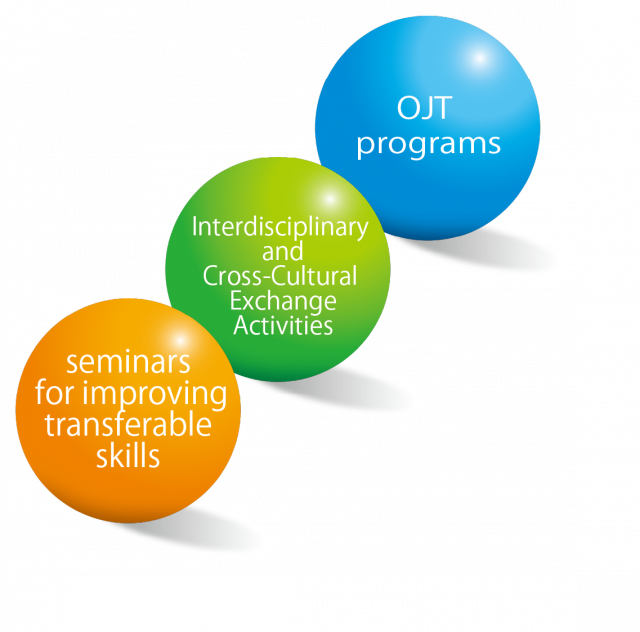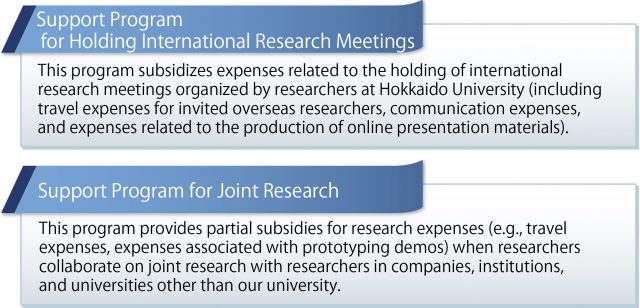Offering a Variety of Programs for Improving Skills and Expanding Networks
 Our training programs consist of on-the-job training (OJT) programs, interdisciplinary and cross-cultural exchanges, and seminars for improving transferable skills.
Our training programs consist of on-the-job training (OJT) programs, interdisciplinary and cross-cultural exchanges, and seminars for improving transferable skills.
There is a significance in the fact that the training programs consist of three pillars, since these are all closely interrelated. For example, young researchers can get started with joint research that makes uses of OJT program support systems or the like, based on ideas that arise out of interdisciplinary and cross-cultural exchanges among researchers. Depending on the state of the implementation of OJT programs or interdisciplinary and cross-cultural exchanges, we will plan a seminar for young researchers to acquire the necessary skills.
Seminar for the Improvement of Transferable Skills
“Transferable skills” is a general term for task-oriented skills (such as problem discovery and problem-solving skills, self-management skills, and interpersonal skills such as communication skills), and refers to abilities that can be transferred irrespective of one’s job.
L-Station convenes seminars for improving transferable skills. The materials covered in the seminar are planned out on the basis of interviews with early-career researchers and the results of questionnaire surveys, keeping in mind the challenges faced in research and education.
These seminars for improving transferable skills may be shared between Nagoya University and Tohoku University, which make up our personnel development consortium.
Interdisciplinary and Cross-Cultural Exchange Activities
L-Station has maintained focus on cross-departmental exchanges among researchers and interdisciplinary and cross-cultural exchanges from an early stage. Recently, we have also been promoting exchange events on the theme of the University’s sustainable development goals (SDGs). With opportunities to interact with researchers in different fields and individuals from outside of the research community, faculty members are able to broaden their horizons and further expand the range of their activities as researchers.
At these exchange events, participants explain the theme of their research to researchers in other fields in an easy-to-understand fashion. It is our hope that these unique events will attract participation not only by early-career researchers but also undergraduates and graduate students who aspire to someday become university researchers. Early-career researchers will also be able to deepen their understanding of each other’s research through questions, which could also lead to the development of new joint research projects across different departments. Young researchers are expected to participate actively in these events and to adopt a proactive approach toward such exchange activities.
On-the-Job Training (OJT) Programs
OJT is a method of learning a job while experiencing it on a practical level. Young Researcher Development Project of L-Station places an emphasis on OJT with the objective of improving management skills on the part of early-career researchers, and has accordingly established systems to support its implementation. For example, we subsidize expenses relating to the holding of symposiums, workshops, and seminars, so that in the process of planning and holding such events faculty members will acquire capabilities outside of their areas of specialization, such as planning skills, management skills, and negotiation and coordination skills.
The Leader Development System Executive Committee (LDSEC) reviews planning proposals submitted by young researchers and L-Station provides support by subsidizing the costs of implementing adopted proposals. The LDSEC will also provide feedback to young researchers in the form of commentary and advice, regardless of whether their proposals are accepted.
Support is available for the following types of OJT, which are available to Young researchers targeted by L-Station according to their project needs.

